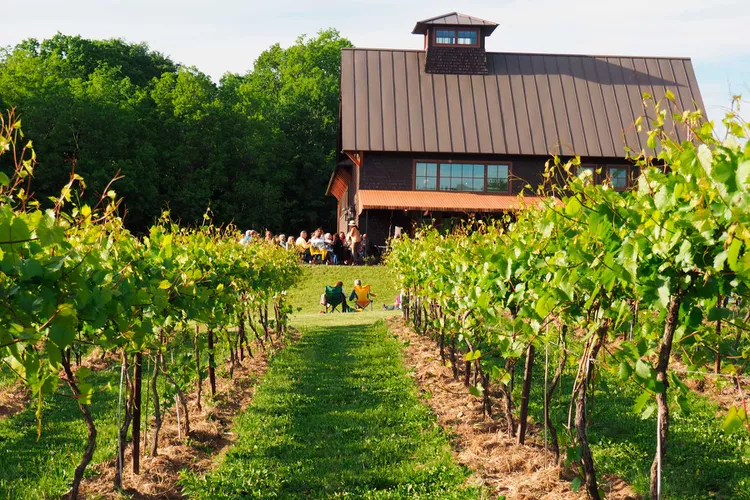Summary
Discover Vermont’s Hidden Wine Treasures
Ever tried a glass of la crescent? What about marquette? In Vermont, lesser-known varietals are becoming the wines of the future.
“‘How’s the frontenac noir this year?’ asked no one, ever,” jokes Kendra Knapik, the owner-grower-winemaker at Vermont’s Ellison Estate Vineyard. However, she certainly knows the answer — Knapik and her husband, Rob, grow this little-known hybrid on their 50-acre plot, which they purchased four years ago on an island near Burlington.
As climate change reshapes the wine-making landscape, many experts believe the industry’s future lies in cooler regions like this, where a “use what you have” ethos is yielding exquisite results. The Knapiks are part of a new generation of Vermont vintners who have revitalized vineyard sites planted with previously underappreciated American grapes: hardy, disease-resistant varietals that align well with low-intervention agriculture and natural winemaking practices.
Ready to explore Vermont’s wine scene? Read on for the producers to know.
Ellison Estate Vineyard
:max_bytes(150000):strip_icc():format(webp)/ellison-estate-vineyard-VTWINE0422-14bbc309a09044a1826bf041ad55779e.jpg)
Two visionaries with backgrounds in medicine and science, Kendra and Rob Knapik purchased this previously abandoned vineyard on Grand Isle in Lake Champlain, which was primarily planted with St. Croix— a dark-red-fleshed hybrid that produces wine with notes of black currant and forest floor. Therefore, visiting in summer allows tasters to experience bottles of surprising richness and depth in the estate’s picturesque tasting room, where the grass is mowed by a flock of sheep. Additionally, look for winter pop-up events in Stowe, the couple’s winter home and production headquarters.
Shelburne Vineyard + Iapetus
:max_bytes(150000):strip_icc():format(webp)/shelburne-vineyard-marquette-vines-VTWINE0422-186aa12749ba41e0ac76f34a5e52e891.jpg)
Located just south of Burlington, Ken Albert’s esteemed and longstanding Shelburne Vineyard has been crafting wines from hybrid grapes such as marquette (noted for its black cherry and baking spice flavors) and Louise Swenson (characterized by floral notes and honey) for years. Current grower-winemaker Ethan Joseph represents the next generation, recently launching Iapetus, his own line of experimental wines in unique hazy hues. Both wine brands are available for tasting at Shelburne’s sleek, Craftsman-style tasting room.
La Garagista
:max_bytes(150000):strip_icc():format(webp)/garagista-wine-and-sheep-VTWINE0422-39c2b89e6cb743b08ed19bed2b9ccb3c.jpg)
The pioneer of natural winemaking in Vermont, Deirdre Heekin established her groundbreaking winery-farm in Bethel in 2010, providing inspiration for many who followed. Heekin offers layered, story-driven wines made from varieties like the white grape la crescent (known for bright acidity and notes of oranges and apricots) through the La Garagista website. Moreover, she occasionally hosts pop-up events and provides curbside pickup.
Stella14
:max_bytes(150000):strip_icc():format(webp)/stella-14-vineyard-VTWINE0422-ea2eaf4a07d342d9aacb61f06c4941f4.jpg)
Vermont native David Keck traveled globally as an opera singer before becoming a master sommelier and co-founding a successful hospitality group in Houston. Ultimately, he returned home to embark on winemaking. Keck leases vineyards from first-generation vintners at Cambridge’s Boyden Valley Winery and released the inaugural wines from his label Stella14 in late 2021. These include marquette (with red fruit, violets, and roses) and frontenac noir (noted for herbaceous and dark fruit notes). A tasting room is expected to open later this year.
More Places to Taste
:max_bytes(150000):strip_icc():format(webp)/dedalus-wine-shop-VTWINE0422-5c4de45585864847aaad35a03711d38a.jpg)
Vermont’s local wine producers are supported by a growing market for sustainable, high-quality wines. Three locations of Dedalus serve as a bottle shop and a cheese-wine-charcuterie counter. Alternatively, visit the multipurpose Cork Restaurant & Natural Wine Shop in Stowe, along with design-conscious establishments like Wilder Wines in Burlington, and Salt & Bubbles Wine Bar and Market in Essex. Visitors to Burlington’s Hotel Vermont can discover local wines showcased at the hotel’s bar and restaurant, including a house pour made in collaboration with Iapetus.




